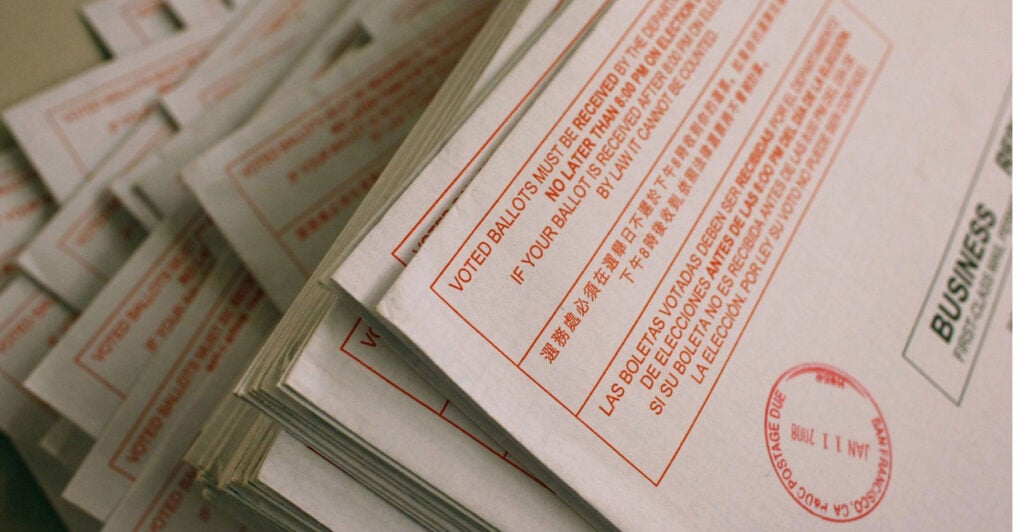As you undoubtedly have heard on television, the internet, and social media, the right to vote is fundamental to the American system.
But as we near Election Day, it’s important to remember that the right to vote means little if our officials can’t maintain election integrity. Fraudulent votes undermine our electoral system and take rightful votes away from others.
Nearly as bad, a dysfunctional or broken election system easily can throw an election into chaos. Just look at what happened in Florida in 2000.
This issue is being magnified in 2020 because a presidential election will coincide with a global pandemic and states are experimenting with widespread mail-in voting, which they haven’t used before.
I highlighted one potential issue in a piece I wrote in September. Here’s what I wrote at the time:
The Alameda County Registrar of Voters notified me by mail at my parents’ address in Oakland that I would receive a ballot when the state sends them out Oct. 5. This is following Gov. Gavin Newsom’s executive order that all California voters receive a mail-in ballot before the Nov. 3 election.
The problem is, I should not be considered a California voter.
Since I left California in 2011, I have registered to vote in two other places. I’ve officially changed my address. And my parents notified election workers at their local voting location after I left the state, but to no avail.
The only reason I was even aware of the situation is that my parents still live at the same address.
Newsom dismissed me on Twitter, saying that it was false I’d received a ballot from California. He never addressed the primary problem, which is ballots being sent to the wrong place or to people who are not California voters.
Just as the initial notice promised, the official California ballot arrived at my parents’ home.
It seems that what happened to me isn’t too uncommon. Many Americans around the country have been receiving ballots for other people, or people who have died.
Many politicians, media, and tech companies seem to be in a hurry to dismiss these problems.
Issues with mail-in ballots aren’t new or limited simply to ballots being sent to the wrong address.
For instance, the Public Interest Legal Foundation, an election integrity group, found that “32 million mail ballots effectively disappeared, went to the wrong house, or were rejected since 2012.”
Hans von Spakovsky, a senior legal fellow at The Heritage Foundation, wrote:
Taking into account the 2012, 2014, 2016, and 2018 federal general elections, 28.3 million mail ballots disappeared after officials gave them to the U.S. Postal Service. There are numerous problems to point fingers at and many explanations as to what happened to these ballots, but the bottom line is simple: Tens of millions of ballots were lost in the mail voting system on a scale not seen at polling places.
And we’ve seen other problems pop up this year.
National Public Radio reported that over 550,000 absentee ballots were rejected during the presidential primaries, far outstripping the numbers in 2016.
NPR noted that officials reject absentee ballots mostly because “required signatures are missing or don’t match the one on record.”
Election integrity is a serious matter.
Widespread fraud and electoral irregularities sent the 1876 presidential election into utter chaos and nearly plunged the United States into a second civil war.
Regardless of what happens Nov. 3 or in any other elections, our system relies on the American people’s faith in free and fair elections.
Americans should be concerned about the possibility of willful malice—or more commonly, mistakes and human error—in our elections. In these contentious times, electoral integrity should be a priority for state officials rather than an issue to be flippantly dismissed.
But given the many challenges in the mail-in voting system, the best way to ensure that your vote is counted is to show up and vote in person.
As Heritage Foundation President Kay Coles James says in a public service announcement:
In this year of chaos and disruptions to the electoral system, ensuring the integrity of our elections has never been more important, and the need for clear voices presenting the unvarnished facts has never been greater. Fortunately, every American can contribute to making sure this year’s elections advance the good of the nation and respect in our democratic process—voting in person.
